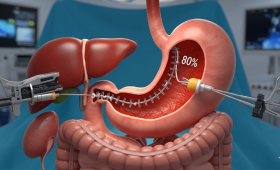Introduction
Obesity has become a growing health concern globally, leading to increased interest in surgical solutions for long-term weight loss. Among the most common bariatric surgeries are gastric sleeve (also known as sleeve gastrectomy) and gastric bypass. Both procedures offer substantial weight loss and significant improvements in obesity-related conditions such as diabetes, hypertension, and sleep apnea. However, there are key differences in how these surgeries are performed, their effects on the body, and the long-term outcomes. In this detailed guide, we will compare gastric sleeve and gastric bypass surgery in terms of their procedures, benefits, risks, and costs, with a special focus on the affordability and quality of care in Turkey, specifically under the Cure Holiday assurance. Additionally, we will explore the price differences between Turkey and Europe for these surgeries.
1. What is Gastric Sleeve Surgery?
1.1. Procedure Overview
Gastric sleeve surgery, or sleeve gastrectomy, is a bariatric surgery that involves removing approximately 75-80% of the stomach, leaving a smaller, tube-like “sleeve.” This significantly reduces the size of the stomach, limiting the amount of food that can be consumed at one time. The smaller stomach size also reduces the production of the hunger hormone ghrelin, helping patients feel full sooner and reducing overall appetite.
- Type of surgery: Restrictive (limits the amount of food intake).
- Duration: Usually lasts about 1-2 hours.
- Recovery time: Patients typically stay in the hospital for 2-3 days and return to normal activities within 4-6 weeks.
1.2. Benefits of Gastric Sleeve
- Significant weight loss: Patients typically lose about 50-70% of their excess body weight within 18 months post-surgery.
- Improved metabolic health: The surgery can lead to remission or improvement of Type 2 diabetes, high blood pressure, and sleep apnea.
- Fewer long-term complications: Compared to gastric bypass, the risk of nutrient malabsorption is lower.
- Appetite reduction: As mentioned earlier, the decrease in ghrelin production helps reduce cravings.
1.3. Risks and Considerations
- Permanent: The procedure is irreversible, as a large portion of the stomach is removed.
- Potential complications: These include bleeding, infection, blood clots, and leaks from the stapled portion of the stomach.
- Slower weight loss: Weight loss may be slower compared to gastric bypass, but still highly effective.
- Risk of acid reflux: Some patients report increased symptoms of acid reflux after surgery.
2. What is Gastric Bypass Surgery?
2.1. Procedure Overview
Gastric bypass surgery, also known as Roux-en-Y gastric bypass, is both a restrictive and malabsorptive procedure. It involves creating a small pouch from the stomach and connecting it directly to the small intestine, bypassing a large portion of the stomach and the first section of the small intestine (the duodenum). This not only restricts the amount of food that can be consumed but also limits the absorption of calories and nutrients.
- Type of surgery: Restrictive and malabsorptive (limits food intake and nutrient absorption).
- Duration: The surgery usually takes about 2-3 hours.
- Recovery time: Hospital stay is typically 3-5 days, and full recovery can take 4-6 weeks.
2.2. Benefits of Gastric Bypass
- Rapid weight loss: Patients often experience more rapid weight loss compared to the gastric sleeve, losing up to 70-80% of excess body weight within 12-18 months.
- Improved obesity-related conditions: The surgery is highly effective in resolving Type 2 diabetes, hypertension, and high cholesterol.
- Long-term results: Gastric bypass has been shown to provide long-term weight loss maintenance for many patients.
- Hormonal changes: The surgery alters gut hormones, helping to reduce hunger and increase feelings of fullness.
2.3. Risks and Considerations
- More complex surgery: The procedure is technically more complex than the gastric sleeve and comes with a higher risk of complications, such as infection, bleeding, and leakage.
- Nutrient deficiencies: Because a portion of the small intestine is bypassed, patients are at greater risk for vitamin and mineral deficiencies, particularly vitamin B12, iron, calcium, and folate.
- Dumping syndrome: Some patients experience dumping syndrome, where food moves too quickly from the stomach to the small intestine, causing nausea, vomiting, diarrhea, and dizziness after eating certain foods.
- Reversible: Unlike gastric sleeve, gastric bypass can sometimes be reversed, though it is a complicated procedure.
3. Comparing Gastric Sleeve and Gastric Bypass
| Criteria | Gastric Sleeve | Gastric Bypass |
|---|---|---|
| Type of Procedure | Restrictive | Restrictive and malabsorptive |
| Surgery Duration | 1-2 hours | 2-3 hours |
| Recovery Time | 2-3 days in hospital, 4-6 weeks for full recovery | 3-5 days in hospital, 4-6 weeks for full recovery |
| Weight Loss | 50-70% of excess body weight in 18 months | 70-80% of excess body weight in 12-18 months |
| Effect on Hunger | Reduces ghrelin (hunger hormone) production | Alters gut hormones, reduces hunger |
| Complication Risk | Lower risk of nutrient deficiencies | Higher risk of nutrient deficiencies and complications |
| Reversibility | Permanent | Reversible, but complex |
| Long-Term Results | Effective but slower weight loss | More rapid and substantial weight loss |
4. Cost Comparison: Turkey vs. Europe
One of the key considerations for patients looking to undergo bariatric surgery is the cost. Medical tourism, especially to countries like Turkey, has become a popular option due to the high quality of care and significantly lower costs compared to Western Europe and the United States. Let’s explore the cost differences and why Turkey is an attractive destination for weight loss surgery under Cure Holiday.
4.1. Gastric Sleeve Costs in Turkey
In Turkey, the average cost of gastric sleeve surgery ranges between $3,500 and $6,000, depending on the hospital and surgeon. This is significantly lower than the average cost in Europe, where the procedure can range from €8,000 to €15,000. The lower cost in Turkey does not reflect a lower quality of care. On the contrary, Turkey has a reputation for high-quality medical facilities and experienced surgeons, particularly in cities like Istanbul, Izmir, and Ankara.
4.2. Gastric Bypass Costs in Turkey
Gastric bypass surgery in Turkey is also much more affordable, with prices ranging from $4,000 to $7,500. In contrast, in Europe, the cost of gastric bypass surgery can be anywhere from €10,000 to €18,000. The affordability in Turkey is largely due to the lower cost of living, government support for medical tourism, and competitive pricing among top-tier hospitals.
4.3. Why Choose Turkey for Bariatric Surgery?
- Accredited hospitals: Many hospitals in Turkey are JCI-accredited (Joint Commission International), ensuring they meet international standards of quality and safety.
- Highly experienced surgeons: Turkish surgeons are often trained in Europe or the United States, and many specialize in bariatric surgery with a high success rate.
- Affordable packages: Medical tourism companies like Cure Holiday offer comprehensive packages that include not only the surgery but also pre-operative assessments, post-operative care, accommodation, and transportation.
- Short waiting times: Unlike many European countries where patients may face long waiting lists, Turkey provides fast access to surgery dates.
5. Cure Holiday: Your Trusted Partner for Bariatric Surgery in Turkey
Cure Holiday is a reputable medical tourism company that offers high-quality and affordable healthcare solutions in Turkey. They specialize in facilitating bariatric surgeries such as gastric sleeve and gastric bypass, ensuring that international patients receive the best possible care during their stay in Turkey.
5.1. Services Provided by Cure Holiday
- Comprehensive consultation: Cure Holiday offers a full consultation process, including online pre-surgical assessments and personalized advice on which surgery is best for the patient’s needs.
- High-quality hospitals: Partner hospitals are among the best in Turkey, with state-of-the-art facilities and highly qualified staff.
- Aftercare support: Cure Holiday provides post-operative care, ensuring that patients recover smoothly and achieve optimal results.
- All-inclusive packages: The company offers all-inclusive medical tourism packages, including:
- Pre-operative tests and consultation
- Surgery fees
- Post-operative medications
- Accommodation in a 4-5 star hotel
- Airport transfers and transportation to the hospital
- English-speaking coordinators to assist throughout the journey
5.2. Why Choose Cure Holiday?
- Affordability: With prices significantly lower than in Europe, Cure Holiday makes it possible for patients to undergo life-changing surgery without



